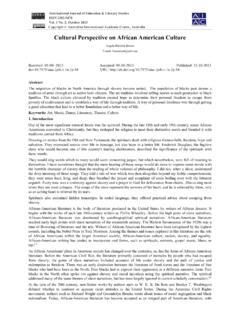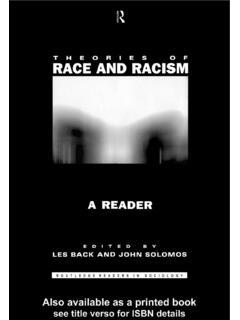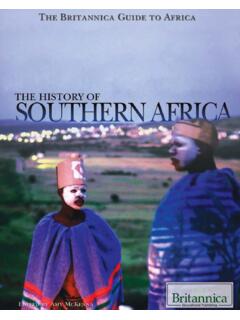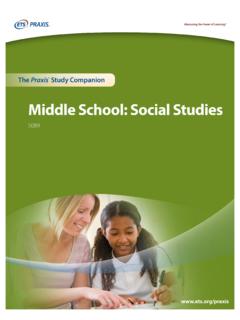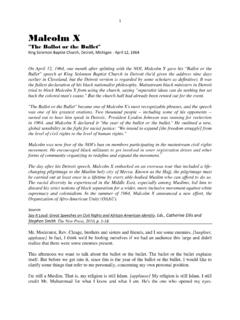Transcription of Understanding Postcolonial Feminism in relation with ...
1 International Journal of Language and Linguistics ISSN 2374-8850 (Print), 2374-8869 (Online) Vol. 1, No. 2; December 2014 45 Understanding Postcolonial Feminism in relation with Postcolonial and Feminist Theories Dr. Ritu Tyagi Department of French School of Humanities Pondicherry University Puducherry 605014 India Abstract Postcolonial feminist theory is primarily concerned with the representation of women in once colonized countries and in western locations. While Postcolonial theorist struggles against the maiden colonial discourse that aims at misrepresenting him as inferior, the task of a Postcolonial feminist is far more complicated. She suffers from double colonization as she simultaneously experiences the oppression of colonialism and patriarchy.
2 She has to resist the control of colonial power not only as a colonized subject, but also as a woman. In this oppression, her colonized brother is no longer her accomplice, but her oppressor. In his struggle against the colonizer, he even exploits her by misrepresenting her in the nationalist discourses. Not only that, she also suffers at the hand of Western feminists from the colonizer countries who misrepresent their colonized counterparts by imposing silence on their racial, cultural, social, and political specificities, and in so doing, act as potential oppressors of their sisters . In this article, I explore these struggles of a Postcolonial feminist, for it is in her struggle against the Postcolonial and feminist theorists that she can assert her identity as a Postcolonial feminist.
3 Keyword: Postcolonial , Third World Feminism , Western Feminism , nationalism , Identity, Postcoloniality Postcolonial , as a term, suggests resistance to colonial power and its discourses that continue to shape various cultures, including those whose revolutions have overthrown formal ties to their colonial rulers. Postcolonial theory, therefore, focuses on subverting the colonizer s discourse that attempts to distort the experience and realities, and inscribe inferiority on the colonized people in order to exercise total control. It is also concerned with the production of literature by colonized peoples that articulates their identity and reclaims their past in the face of that past's inevitable otherness.
4 The task of a Postcolonial theorist is to insert the often absent colonized subject into the dominant discourse in a way that it resists/subverts the authority of the colonizer. Postcolonial feminist theory is primarily concerned with the representation of women in once colonized countries and in Western locations. It concentrates on construction of gender difference in colonial and anti-colonial discourses, representation of women in anti-colonial and Postcolonial discourses with particular reference to the work of women writers. The Postcolonial feminist critics raise a number of conceptual, methodological and political problems involved in the study of representation of gender.
5 While Postcolonial theorist struggles against the maiden colonial discourse that aims at misrepresenting him as inferior, the task of a Postcolonial feminist is far more complicated. She suffers from double colonization (a term coined by Kirsten Holst Peterson and Anna Rutherfold and refers to the ways in which women have simultaneously experienced the oppression of colonialism and patriarchy). She has to resist the control of colonial power not only as a colonized subject, but also as a woman. In this oppression her colonized brother is no longer her accomplice, but her oppressor. In his struggle against the colonizer, he even exploits her by misrepresenting her in the nationalist discourses.
6 Not only that, she also suffers at the hands of Western feminists from the colonizer countries who misrepresent their colonized counterparts by imposing silence on their racial, cultural, social, and political specificities, and in so doing, act as potential oppressors of their sisters . In this article, I explore these challenges of a Postcolonial feminist, for it is in her struggle against the Postcolonial and feminist theorists that she can assert her identity as a Postcolonial feminist. Published by Center for Promoting Ideas, USA Copyright The Author(s) 46 Postcolonial feminist theory exerts a pressure on mainstream Postcolonial theory in its constant iteration of the necessity to consider gender issues.
7 Postcolonialism and Feminism have come to share a tense relationship as some feminist critics point out that Postcolonial theory is a male-centered field that has not only excluded the concerns of women, but also exploited them. Postcolonial feminist theorists have accused Postcolonial theorists not only of obliterating the role of women from the struggle for independence, but also of misrepresenting them in the nationalist discourses. Edward Said s seminal study Orientalism itself accorded little attention to female agency and discussed very few female writers. Homi K. Bhabha s work on the ambivalence of colonial discourses explores the relationship between a colonizing subject and a colonized object without reference to how the specifics of gender might complicate his model.
8 Critics such as Carole Boyce Davies who are suspicious of the male-centered bias of Postcolonial critique often ask where are the women in the theorizing of postcoloniality? (Black Women 80). nationalism has historically functioned as one of the most powerful weapons for resisting colonialism, and for establishing the space of a Postcolonial identity. Although nationalism has nurtured much of the movement toward women emancipation in Asia, Africa, and South America ( the Third World Feminism was acted out against a background of nationalist struggle aimed at achieving political independence), yet Feminism and nationalism have developed an uneasy, if not antagonistic relationship because of the often conflicting nature of their social and political goals.
9 On the one hand, Feminism has attempted to empower a community of women that transcends cultural characteristics and geographic boundaries; on the other nationalism has exaggerated such characteristics and boundaries in order to resist hegemonic occupation. Franz Fanon, a celebrated Postcolonial theorist has criticized positions such as Feminism for their neo-liberal universalism. Ketu Katrak has argued in Indian nationalism , Gandhian Satyagraha, and the Engendering of National Narratives that Mahatma Gandhi s resistance to British colonial rule in India during the 1920s and 1930s used specifically gendered representations for the purposes of Indian nationalism , but ultimately did little to free Indian women from their patriarchal subordination to men.
10 He appropriated images of passive women to promote his campaign of passive resistance to British rule. Both men and women were encouraged to adopt a passivity exclusively associated with femininity. She states: Gandhi s specific representations of women and female sexuality, and his symbolizing from Hindu mythology of selected female figures who embodied a nationalist spirit promoted [..] a traditional ideology wherein female sexuality was legitimately embodied only in marriage, wifehood, domesticity- all forms of controlling women s bodies. (395-6) Indian nationalism attempted at controlling female bodies by imprisoning them into stereotypes, where female symbolized the pre-colonial, the traditional, and the untouched domestic spaces.


